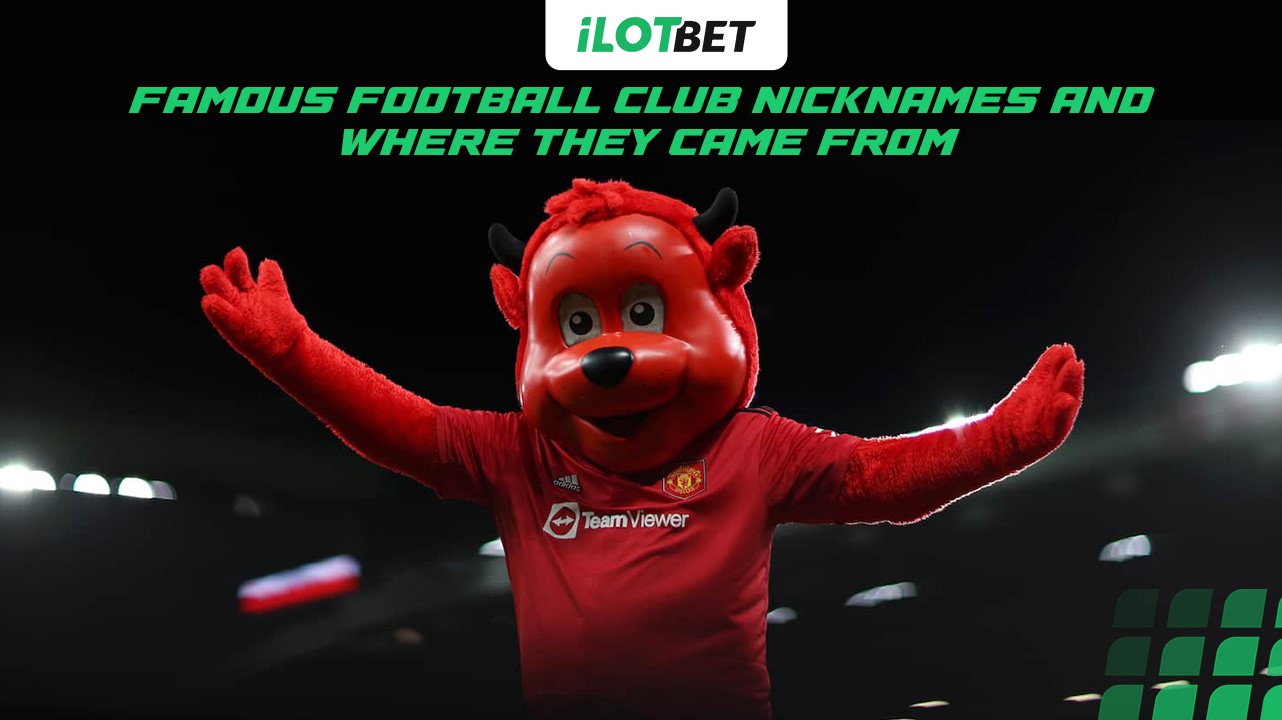The Stories Behind Football Clubs’ Famous Nicknames
Football clubs are more than just teams—they’re cu

Football clubs are more than just teams—they’re cultural institutions. Fans develop lifelong loyalties to their clubs and as part of this devotion, affectionate or sometimes humorous nicknames arise. These nicknames often reflect the history, heritage, or location of the club and have become an integral part of football culture.
In this article, iLOTBET takes a closer look at the origins of the nicknames of some of the world’s most famous football clubs.
1. Real Madrid – “Los Blancos”
Real Madrid’s nickname, Los Blancos (The Whites), is a straightforward reference to their iconic all-white kit. Introduced in 1925, the pristine white kit has been synonymous with the club ever since, symbolizing their purity and excellence on the pitch. Real Madrid’s dominance in European football only adds weight to the idea of their “clean” superiority. Another popular nickname is Los Merengues, referencing the meringue dessert, similarly associated with whiteness and elegance.
2. Barcelona – “Blaugrana”
FC Barcelona is known as Blaugrana, which directly translates to “Blue and Red,” a reference to the club’s distinctive kit. The origin of these colors is uncertain, but legend has it that the blue and red were inspired by the Swiss club FC Basel, where one of the club's founders, Joan Gamper, had played. Beyond their colors, the club is also affectionately referred to as Barça by fans and supporters worldwide.
3. Atlético Madrid – “Los Colchoneros”
Atletico Madrid’s nickname, Los Colchoneros (The Mattress Makers), derives from the club’s red and white striped kits, which resemble traditional mattresses in Spain. The nickname is a nod to this peculiar resemblance and has stuck with the team for decades. While the club has evolved into a European powerhouse, this quirky moniker keeps Atletico’s working-class origins at the forefront of its identity.
4. Arsenal – “The Gunners”
Arsenal’s famous nickname, The Gunners, comes from the club’s origins in the armaments industry. Arsenal was founded in 1886 by workers at the Royal Arsenal in Woolwich, a munitions factory. The club's badge features cannons, solidifying its identity with artillery and warfare. Fans and players alike are proud of this heritage, which is why they often chant about their “Gooner” (a playful version of Gunner) identity.
5. Manchester United – “The Red Devils”
The Red Devils is a nickname that embodies Manchester United's fierce reputation. This nickname came into use after Sir Matt Busby admired the French rugby team Les Diables Rouges in the 1950s. The club adopted the name, replacing their previous nickname, The Busby Babes, which had tragic connotations after the Munich air disaster in 1958. Today, The Red Devils symbolizes Manchester United’s winning mentality and the fear they strike into opponents.
6. Tottenham Hotspur – “Spurs” or “The Lilywhites”
Tottenham Hotspur, often simply referred to as Spurs, is also known as The Lilywhites. The latter nickname refers to their traditional white kit, worn since the club's early days. The “Spurs” nickname comes from the club's official name, which references Harry Hotspur, a 14th-century knight famed for his courage and tenacity. These attributes align with the club’s ethos and identity over the years.
7. Chelsea – “The Blues”
Chelsea is famously known as The Blues, a simple reference to the club’s deep blue kit that has been a staple since the 1910s. Over time, the nickname has become emblematic of the club’s success, particularly since Roman Abramovich’s ownership in the 2000s, which saw the rise of Chelsea as a dominant force in English football. The club is also occasionally referred to as The Pensioners, a nod to the retired soldiers from the Royal Hospital Chelsea, but this nickname has fallen out of common use.
8. Liverpool – “The Reds”
Liverpool's nickname, The Reds, mirrors the passion and energy with which the club plays. Originally, Liverpool wore blue and white kits, but in 1896 they switched to the now-famous all-red ensemble. This bold color, paired with the fervor of their fanbase, particularly the iconic Kop stand, reinforces Liverpool’s identity as a club of boldness, passion, and power.
9. Bayern Munich – “Die Roten”
Bayern Munich’s nickname, Die Roten (The Reds), stems from the club’s traditional red kit. Over the years, Bayern Munich has become synonymous with German football dominance, and the nickname represents their strength, power, and consistency in both domestic and European competitions.
10. Borussia Dortmund – “Die Schwarzgelben”
Borussia Dortmund is affectionately known as Die Schwarzgelben (The Black and Yellows) due to their iconic black and yellow kit. The vibrant colors are a core part of the club’s identity, symbolizing their lively and energetic style of play, and have become inseparable from the passionate fan culture in Dortmund.
11. Bayer Leverkusen – “Die Werkself”
Bayer Leverkusen is commonly referred to as Die Werkself (The Company XI). This nickname reflects the club’s unique origins, being founded by workers from the pharmaceutical giant Bayer AG in 1904. Unlike many clubs, Leverkusen still maintains a strong connection to its corporate roots, and the nickname emphasizes that heritage.
12. Schalke 04 – “Die Knappen”
Schalke 04’s nickname, Die Knappen (The Miners), comes from the club’s roots in the mining region of Gelsenkirchen. Historically, many Schalke supporters and early players worked in the coal mines, and the nickname honors this working-class heritage. Even today, the club’s identity is deeply tied to the industrial background of the Ruhr Valley.
13. Juventus – “La Vecchia Signora”
Juventus is known as La Vecchia Signora (The Old Lady), an unusual nickname that captures the duality of tradition and power. The “old” part refers to the club being one of Italy’s oldest, while “lady” adds an affectionate tone, suggesting nobility and elegance. Despite the graceful connotations, Juventus remains a powerhouse of Italian football, known for its ruthlessness and winning mentality.
14. AS Roma – “I Giallorossi”
AS Roma’s nickname, I Giallorossi (The Yellow and Reds), is a direct reference to the club’s traditional colors. These colors, drawn from the flag of Rome, represent the club’s deep connection to the city and its history. The colors are worn with pride by both players and fans, symbolizing their loyalty to Rome.
15. FC Porto – “Os Dragões”
FC Porto’s nickname, Os Dragões (The Dragons), comes from the dragon featured on the club’s crest, symbolizing strength, courage, and resilience. This nickname reflects Porto’s competitive nature and has become a source of pride for both the club and its supporters, particularly in their numerous triumphs in Portuguese football.
16. Paris Saint-Germain (PSG) – “Les Parisiens”
PSG is often referred to as Les Parisiens (The Parisians), a simple but effective nickname that ties the club to the city of Paris. In a broader sense, the nickname speaks to PSG’s place as a modern symbol of Parisian glamour, style, and, more recently, footballing excellence. Occasionally, they are also called Les Rouge-et-Bleu (The Red and Blue), in homage to their colors.
17. Olympique Lyonnais – “Les Gones”
Olympique Lyonnais is popularly known as Les Gones (The Kids), a reference to the youthfulness of the team and the city of Lyon’s dialect, in which Gones means “children.” Over time, this nickname has come to symbolize the club’s emphasis on developing young talent and its forward-thinking approach to football.
18. Ajax – “de Godenzonen”
Ajax’s nickname, de Godenzonen (The Sons of the Gods), speaks to the club’s rich tradition and the almost divine status it holds in Dutch football. The name reflects Ajax’s domination in the Netherlands and their beautiful style of play, often referred to as Total Football, a philosophy that’s been ingrained in the club’s culture.
19. River Plate – “Los Millonarios”
River Plate’s nickname, Los Millonarios (The Millionaires), was coined in the 1930s when the club paid an unprecedented amount of money for players. This nickname, denoting wealth, reflects River’s status as one of the richest and most successful clubs in Argentina and South America.
20. Boca Juniors – “Los Xeneizes”
Boca Juniors are called Los Xeneizes, a nod to the Genoese immigrants who founded the club in the early 1900s. The nickname reflects Boca’s working-class roots and their identity as a club of the people. Boca’s fierce rivalry with River Plate adds to the cultural weight of their nickname, with the two clubs being symbols of contrasting Argentine identities.
Discover more fascinating football stories and get the best odds on your favorite teams by joining iLOTBET today! Register now and experience top-tier sports betting.







